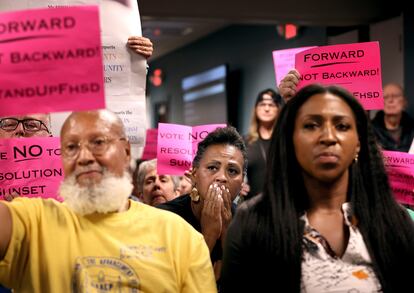School board in Missouri, now controlled by conservatives, revokes anti-racism resolution
Thursday’s decision in Missouri follows a trend. School board matters have become intense political battlegrounds

In the national reckoning that followed the police killing of George Floyd three years ago, about 2,000 protesters took to the streets in a St. Louis suburb and urged the mostly white Francis Howell School District to address racial discrimination. The school board responded with a resolution promising to do better.
Now the board, led by new conservative board members elected since last year, has revoked that anti-racism resolution and copies of it will be removed from school buildings.
The resolution passed in August 2020 “pledges to our learning community that we will speak firmly against any racism, discrimination, and senseless violence against people regardless of race, ethnicity, nationality, immigration status, religion, sexual orientation, gender identity, or ability.
“We will promote racial healing, especially for our Black and brown students and families,” the resolution states. “We will no longer be silent.”
The board’s decision follows a trend that began with backlash against COVID-19 pandemic policies in places around the nation. School board elections have become intense political battlegrounds, with political action groups successfully electing candidates promising to take action against teachings on race and sexuality, remove books deemed offensive and stop transgender-inclusive sports teams.
The Francis Howell district is among Missouri’s largest, with 17,000 students, about 87% of whom are white. The vote, which came during an often contentious meeting Thursday, rescinded resolutions 75 days after “a majority of current Board of Education members were not signatories to the resolution or did not otherwise vote to adopt the resolution.”
While a few others also will be canceled, the anti-racism resolution was clearly the focus. Dozens of people opposed to its revocation packed the board meeting, many holding signs reading, “Forward, not backward.”
Kimberly Thompson, who is Black, attended Francis Howell schools in the 1970s and 1980s, and her two children graduated from the district. She described several instances of racism and urged the board to stand by its 2020 commitment.
“This resolution means hope to me, hope of a better Francis Howell School District,” Thompson said. “It means setting expectations for behavior for students and staff regardless of their personal opinions.”
The board’s vice president, Randy Cook, said phrases in the resolution such as “systemic racism” aren’t defined and mean different things to different people. Another board member, Jane Puszkar, said the resolution served no purpose.
“What has it really done,” she asked. “How effective has it really been?”
Since the resolution was adopted, the makeup of the board has flipped. Just two board members remain from 2020. Five new members elected in April 2022 and April 2023 had the backing of the conservative political action committee Francis Howell Families.
In 2021, the PAC described the anti-racism resolution as “woke activism” and drafted an alternative resolution to oppose “all acts of racial discrimination, including the act of promoting tenets of the racially-divisive Critical Race Theory, labels of white privilege, enforced equity of outcomes, identity politics, intersectionalism, and Marxism.”
Cook, who was elected in 2022 and sponsored the revocation, said there is no plan to adopt that alternative or any other.
“In my opinion, the school board doesn’t need to be in the business of dividing the community,” Cook said. “We just need to stick to the business of educating students here and stay out of the national politics.”
Many districts are dealing with debates over topics mislabeled as critical race theory. School administrators say the scholarly theory centered on the idea that racism is systemic in the nation’s institutions is not taught in K-12 schools.
Others assert that school systems are misspending money, perpetuating divisions and shaming white children by pursuing initiatives they view as critical race theory in disguise.
In 2021, the Ohio State Board of Education rescinded an anti-racism and equity resolution that also was adopted after Floyd was killed by a Minneapolis police officer in May 2020. It was replaced with a statement promoting academic excellence without respect to “race, ethnicity or creed.”
Racial issues remain especially sensitive in the St. Louis region, nine years after a police officer in Ferguson, Missouri, fatally shot 18-year-old Michael Brown during a street confrontation. Officer Darren Wilson was not charged and the shooting led to months of often violent protests, becoming a catalyst for the national Black Lives Matter movement.
Revoking the Francis Howell resolution “sets a precedent for what’s to come,” St. Charles County NAACP President Zebrina Looney warned.
“I think this is only the beginning for what this new board is set out to do,” Looney said.
Sign up for our weekly newsletter to get more English-language news coverage from EL PAÍS USA Edition
Tu suscripción se está usando en otro dispositivo
¿Quieres añadir otro usuario a tu suscripción?
Si continúas leyendo en este dispositivo, no se podrá leer en el otro.
FlechaTu suscripción se está usando en otro dispositivo y solo puedes acceder a EL PAÍS desde un dispositivo a la vez.
Si quieres compartir tu cuenta, cambia tu suscripción a la modalidad Premium, así podrás añadir otro usuario. Cada uno accederá con su propia cuenta de email, lo que os permitirá personalizar vuestra experiencia en EL PAÍS.
¿Tienes una suscripción de empresa? Accede aquí para contratar más cuentas.
En el caso de no saber quién está usando tu cuenta, te recomendamos cambiar tu contraseña aquí.
Si decides continuar compartiendo tu cuenta, este mensaje se mostrará en tu dispositivo y en el de la otra persona que está usando tu cuenta de forma indefinida, afectando a tu experiencia de lectura. Puedes consultar aquí los términos y condiciones de la suscripción digital.








































